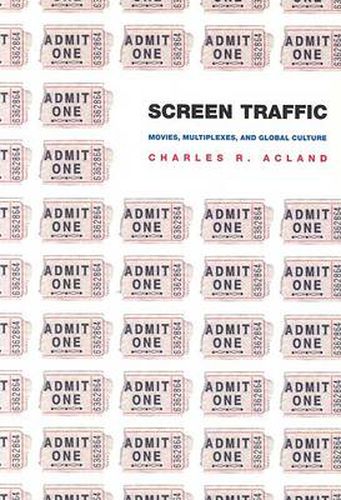Readings Newsletter
Become a Readings Member to make your shopping experience even easier.
Sign in or sign up for free!
You’re not far away from qualifying for FREE standard shipping within Australia
You’ve qualified for FREE standard shipping within Australia
The cart is loading…






In Screen Traffic Charles R. Acland looks at how the commercial movie industry has altered conceptions of movie going both within the industry and among audiences. He shows how studios, in their increasing reliance on revenues from audiences around the world, have cultivated a global understanding of their products over the past fifteen to twenty years. In doing so, Acland argues, they have significantly changed the cultural practice of movie going. He explores this transformation by investigating the generation and dissemination of knowledge about studio movies. Integrating film and cultural theory with promotional materials, entertainment news, trade publications, and economic commentary, Acland examines an array of sites where a new understanding of movies and movie going has developed within popular culture and the entertainment industry. One way a diverse audience is united, he contends, is through a growing Hollywood insiderism, which conveys to the public not only news about stars and features, but also industry financial information, most notably the box office numbers. Another key site shaping contemporary movie going, he argues, is the modern megaplex. Acland traces the history of the megaplex–characterized by its large auditoriums, large number of screens, and the activities it sold in addition to film spectatorship–from its genesis in the re-entry of studios into the movie exhibition business in 1986 through to 1998, when reports of the economic failure of the multiplex began to surface–just as the rise of digital technologies seemed to signal another wave of change in the movie industry.
$9.00 standard shipping within Australia
FREE standard shipping within Australia for orders over $100.00
Express & International shipping calculated at checkout
In Screen Traffic Charles R. Acland looks at how the commercial movie industry has altered conceptions of movie going both within the industry and among audiences. He shows how studios, in their increasing reliance on revenues from audiences around the world, have cultivated a global understanding of their products over the past fifteen to twenty years. In doing so, Acland argues, they have significantly changed the cultural practice of movie going. He explores this transformation by investigating the generation and dissemination of knowledge about studio movies. Integrating film and cultural theory with promotional materials, entertainment news, trade publications, and economic commentary, Acland examines an array of sites where a new understanding of movies and movie going has developed within popular culture and the entertainment industry. One way a diverse audience is united, he contends, is through a growing Hollywood insiderism, which conveys to the public not only news about stars and features, but also industry financial information, most notably the box office numbers. Another key site shaping contemporary movie going, he argues, is the modern megaplex. Acland traces the history of the megaplex–characterized by its large auditoriums, large number of screens, and the activities it sold in addition to film spectatorship–from its genesis in the re-entry of studios into the movie exhibition business in 1986 through to 1998, when reports of the economic failure of the multiplex began to surface–just as the rise of digital technologies seemed to signal another wave of change in the movie industry.